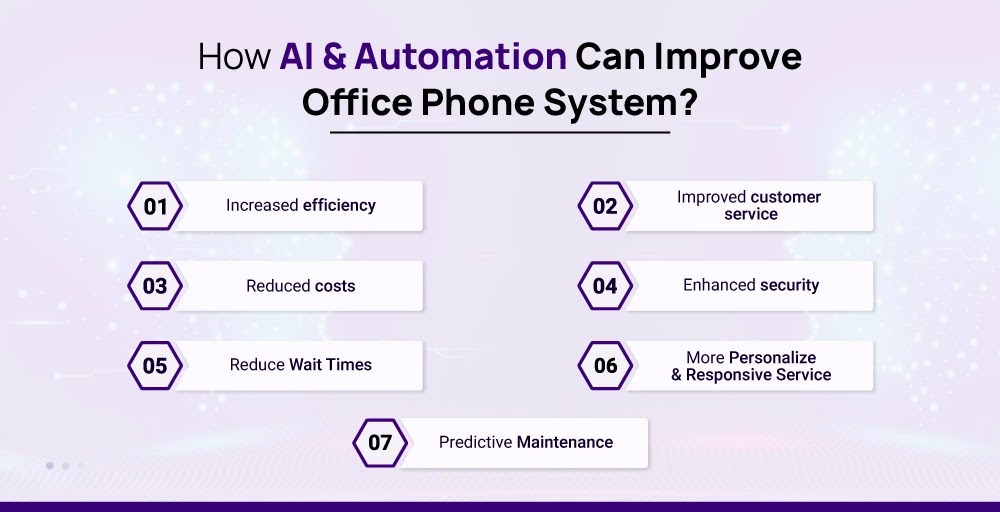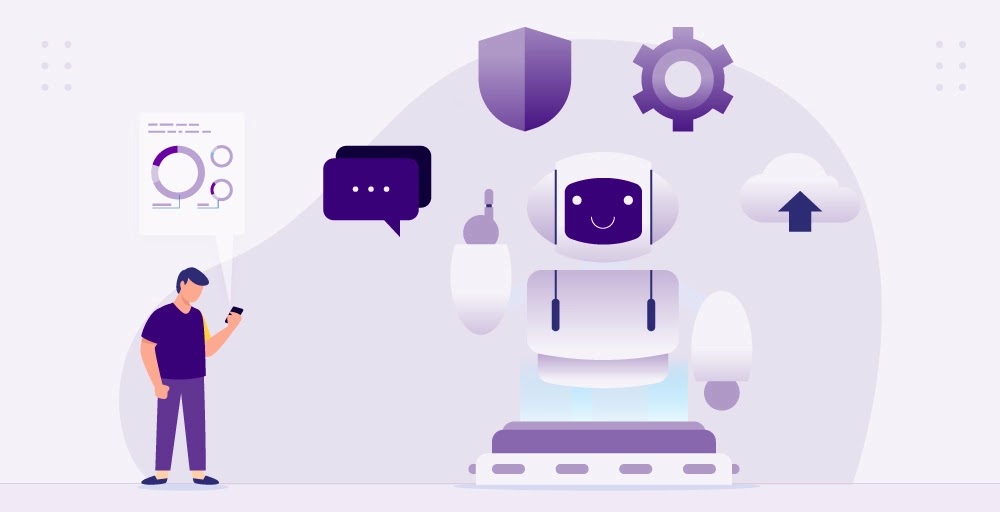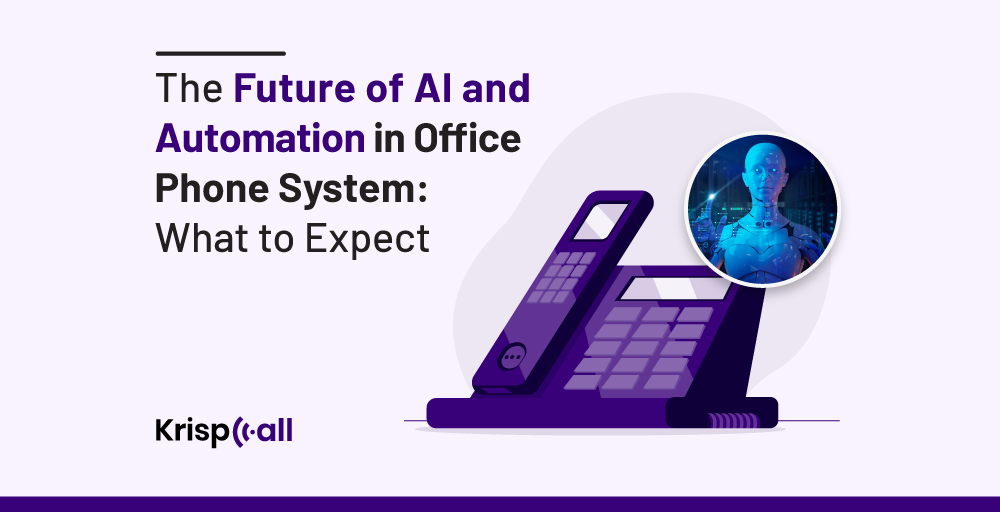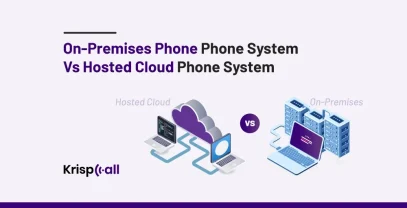Artificial intelligence (AI) has been a hot topic since the early 2000s. AI is taking over many aspects of our daily lives, from self-driving cars to virtual assistants, likewise office phone system is no exception. There is already widespread use of AI in office phone systems. Many Tech companies have used AI chatbots, virtual assistants, and other automation technologies for handling large volumes of incoming and outgoing calls.
We have already witnessed a lot of changes brought by AI and automation in office phone systems. However, we can anticipate more changes in the future.
So, in this blog, we will discuss the future of AI and automation in office phone systems and what we can expect from them. Moreover, we will explore the potential benefits of AI and automation and the best practices for implementing them.
So, stick with us to know what’s next in office communication with AI and automation.
Future Trends & Predictions in AI & Automation for Office Phone System
In this modern world, artificial intelligence and automation have rapidly transformed how we work, and office phone systems are no exception.
The use of AI in office phone systems is increasing day by day. These are some future trends and predictions in Artificial Intelligence (AI) and automation for office phone systems.
1. AI-Powered Virtual Receptionist
A virtual receptionist is one of the features of the VoIP office phone system. It is a set of pre-recorded messages containing call routing options. In the future, with the influence of AI and automation, there will be many positive changes in the current virtual receptionist capabilities.
AI-powered virtual receptionists will have better natural language processing skills to answer complex questions. Additionally, it will support multiple languages, catering to various clientele and international customers.
Not only this, it will be equipped with emotional intelligence to assess the caller’s mood and respond accordingly, resulting in greater customer satisfaction.
Additionally, AI-powered virtual receptionists can answer calls in a way that makes them indistinguishable from human receptionists.
2. Intelligent Call Routing
AI will also influence call routing procedures. Call routing influenced by AI will become more accurate at predicting customer needs and routing them to the most appropriate agents or departments in real-time.
For example, when directing calls, it will consider contextual information, such as the caller’s recent interactions with the company.
Furthermore, AI-driven routing will seamlessly integrate with CRM systems to use customer data for intelligent call routing. Call routing influenced by AI and automation will help provide maximum customer support and increase customer satisfaction.
3. AI-Powered Call Screening
AI and automation will ease the call screening process for an office phone system. AI-powered call screening will make identifying and filtering unwanted calls, such as spam and sales calls, easier. This will help to reduce interruptions and ensure that only legitimate calls reach their destinations.
Furthermore, in AI-powered call screening, users will have more control over call screening parameters, which will help them set personalized specific criteria for accepting or rejecting calls. AI call screening will also include better privacy features to protect your sensitive information.
4. AI-Powered Speech Recognition
AI-powered speech recognition will simplify our lives in many ways. The first benefit is that it makes voice commands and transcriptions more accurate, especially in noisy environments. Secondly, it enables more sophisticated voice-controlled functionality, including control of office phone systems.
Thirdly, we will be able to control various aspects of phone calls with our voice alone, such as forwarding calls and setting up meetings.
5. Chatbots
Most people prefer communicating with companies through chat because it is immediate, interactive, available 24 hours a day, and doesn’t require live agent support.
Hence, small to large tech companies can use AI chatbots to carry out and automate mundane tasks, like answering customers’ frequently asked questions, setting appointments, revising, and much more.
As of 2023, the most used chatbot platform used by many e-commerce organizations includes Sephora, Chatfuel, SnatchBot, Ada, Snap Travel, etc.
How AI & Automation Can Improve Office Phone System?
AI and Automation can improve office phone systems in several ways. Some of them are:

1. Increased efficiency
Automation and artificial intelligence improve the efficiency of office phone systems by automating routine and time-consuming tasks. It helps reduce the time customers spend waiting on call hold and allows employees to concentrate on more complex and value-added tasks.
Additionally, AI-powered software can improve productivity, increase speed, and reduce errors in various business processes.
2. Improved customer service
By utilizing AI-powered chatbots, businesses can provide fast responses to customers, improving customer experience and reducing wait times. Also, AI algorithms can provide personalized recommendations based on customer data, enhancing customer satisfaction and loyalty.
3. Reduced costs
AI and automation also help reduce overall costs associated with office phone systems. By automating several repetitive and time-consuming tasks, AI can lessen the number of agents required to carry out those tasks. As a result, businesses can reduce labor costs and improve their foundation.
4. Enhanced security
AI helps to protect office phone systems from cyber attacks like phishing, malware, etc. AI uses machine learning algorithms to detect and respond to threats in real-time.
For example, AI-based phishing detection solutions use machine learning to detect patterns and irregularities that indicate a phishing attack. Users get alerted when they click on a suspicious link or enter personal info in r phishing emails with AI-based solutions.
5. Reduce Call Wait Times
AI reduces call wait time by routing customer’s phone calls to suitable agents and departments. AI chatbots offer instant responses and guidance to multiple clients’ queries at once.
Similarly, advanced AI systems can prioritize calls based on factors like the client’s history with the company and the nature of the issue. An important or high-priority call is immediately transferred to a human agent, while AI will handle low-priority calls. These help reduce wait times and provide a seamless customer experience.
6. More Personalize and Responsive Service
AI analyzes past interactions and understands customers’ individual needs and preferences to provide more personalized and responsive service. They can greet customers by name and recommend products that match their needs and interests.
7. Predictive Maintenance
By using AI algorithms, businesses can predict when equipment or machinery will fail, allowing them to schedule proactive maintenance. It saves you money on repairs, reduces downtime, and makes equipment last longer.
How to Implement AI & Automation in Your Office Phone System?
AI and automation are beneficial tools to enhance the efficiency of your phone system. However, they come with limitations and challenges if not implemented correctly and best practices are not followed.

Consider the following tactics to implement AI and automation in your office phone system:
1. Learn what AI can and cannot do
You must research what AI can and cannot do before incorporating it into your office phone system. Then, determine what features you can leverage to make your phone system more efficient. After that, find out whether implementing AI can work process automation or is merely a waste of time.
2. Know your end goals
You must understand why you are implementing AI and automation in your office phone system.
For this, ask yourself these two questions: What area are you trying to improve with Artificial Intelligence (AI) and automation? Can you reach your prospects or offer a specific service more easily by adding a new AI software program?
3. Research and Select the best AI and automation tools
Explore various AI and automation tools available and select the best one that aligns with your end goals. When selecting suitable tools, you can consider various factors like scalability, flexibility, user-friendliness, and integration capabilities.
4. Develop a plan
Once you have determined where you want to implement AI and automation and selected the appropriate information systems tools, it’s time to develop a plan to employ AI.
List out all the steps involved, the timeframe, and the human resources involved. This rough plan will help significantly in the installation process.
5. Communicate the plan to your employees
You must clearly communicate the plan to your other team members. Explain to them the reasons behind implementing AI tools, what benefits you are expecting, and their key roles and responsibilities throughout the process.
6. Train your employees on the new system
Employees may not have an idea of how to use the new system. Hence, you must conduct a training program to familiarize employees with the new system and how to use the system effectively to get maximum benefits.
You must cover all the aspects of the new system during a training session. Provide hands-on support wherever needed.
7. Monitor the system and make adjustments as needed
You must frequently monitor the system to check if it is working correctly and is meeting your expectations. And if your IT infrastructure isn’t supporting AI software, you should make adjustments as needed.
Conclusion
As we come to the end of this blog, we hope this blog will help you to understand the uses of Artificial Intelligence (AI) in office phone systems. The changes robotic process automation and deep learning tools bring to office phone systems are boundless.
In the coming days, with the advancement of technology, we can expect artificial intelligence to enhance the customer experience and revolutionize the workplace in even more innovative ways. Some trends and predictions in AI technology and tools for office phone systems include intelligent call routing, AI-powered virtual receptionists, enhanced speech recognition, and chatbots.
Similarly, only installing AI software doesn’t guarantee the high efficiency of traditional phone systems. It is necessary to follow the above-mentioned best practices to implement AI and automation to reap their full benefits.





